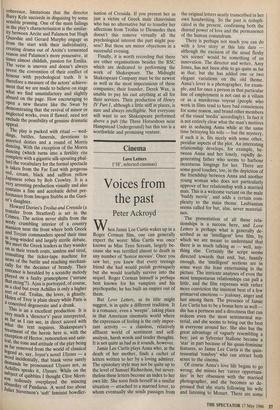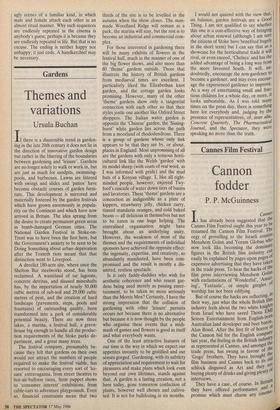Cinema
Love Letters (`18', selected cinemas)
Voices from the past
Peter Ackroyd
When Jamie Lee Curtis wakes up in a Roger Corman film, one can generally expect the worst: Miss Curtis was once' known as Miss Teen Scream, largely be- cause she was terrified almost to death in any number of 'horror movies'. Once you saw her, you knew that every teenage friend she had would perish grotesquely but she would tearfully survive into the sequel. Roger Corman himself is perhaps best known for his vampires and his psychopaths; he has built an empire out of them.
But Love Letters, as its title might suggest, is in quite a different tradition. It is a romance, even a `weepie', taking place in that American cinematic world where the expression of feeling is the only impor- tant activity — a classless, relatively affluent world of sentiment and self- analysis, harsh words and tender thoughts. It is not quite as bad as it sounds, however. Jamie Lee Curtis plays Anna who, at the death of her mother, finds a cachet of letters written to her by a loving admirer. The epistolary style may not be quite up to the level of Samuel Richardson, but never- theless these letters become an index to her own life. She soon finds herself in a similar situation — attached to a married lover, to whom eventually she sends passages from the original letters neatly transcribed in her own handwriting. So the past is redupli- cated in the present, confirming both the diurnal power of love and the permanence of the human conundrum.
There is perhaps not much you can do with a love story at this late date although the excision of the usual fleshy `sex scenes' would be something of an innovation. The director and writer, Amy Jones, has not been able to go quite as far as that; but she has added one or two elegant variations on the old theme. Anna's lover is a photographer, for exam- ple, and for once a person in that particular line of employment is not cast as a villain or as a murderous voyeur (people who work in films tend to have bad consciences for some reason, and brand other members of the visual 'media' accordingly). In fact it is not entirely clear what the man's motives are in seducing Anna while at the same time betraying his wife — but the mystery, if such it is, fits nicely with some other, peculiar aspects of the plot. An interesting relationship develops, for example, be- tween Anna and her lonely, rapidly de- generating father who seems to harbour incestuous longings for her. There are some good touches, too, in the depiction of the friendship between Anna and another young woman who does not particularly approve of her relationship with a married man. This is a welcome variant on the male `buddy movie', and adds a certain com- plexity to the main theme. Lesbianism seems called for but, alas, never material- ises.
The presentation of all these rela- tionships is a success here, and Love Letters is perhaps what is generally de- scribed as an 'intelligent' love film, by which we are meant to understand that there is as much talking as — well, any- thing else. Certainly the script seems directed towards that end, but, funnily enough, the 'intelligent' sections are in some ways the least entertaining in the picture. The intricate analyses of even the most tempestuous relationships can pall a little, and the film expresses with rather more conviction the insistent beat of a few primaeval emotions — jealousy, anger and lust among them. The presence of Jamie Lee Curtis has to be a bonus here as well - she has a pertness and a directness that can redeem even the most sentimental ma- terial, and she seems to bring out the best in everyone around her. She also has the great advantage of vaguely resembling a boy; just as Sylvester Stallone became a `star' in part because of his quasi-feminine features, so Jamie Lee Curtis is the quin- tessential 'tomboy' who can attract both sexes to the cinema.
Of course Anna's love life begins to go wrong; she misses her `career opportuni- ties' in her obsession with the married photographer, and she becomes so de- pressed that she starts following his wife and listening to Mozart. There are some ugly scenes of a familiar kind, in which male and female attach each other in an almost ritual manner. Why such sequences are endlessly repeated in the cinema is anybody's guess; perhaps it is because they are endlessly repeated in life. But that is no excuse. The ending is neither happy nor unhappy; it just ends. A handkerchief may be necessary.



















































 Previous page
Previous page